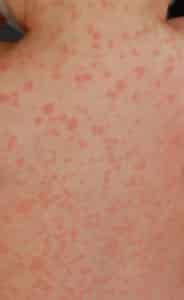To read the previous part, go to Origins of Food Allergies.
Updated article : October, 2023.
The symptoms of a food allergy can vary from one child to another and in intensity. When a baby is in contact with an allergen, they will react by producing antibodies and could present the following signs:

- Eczema or urticaria;
- Skin swelling (ex.: swollen eyes, bloated face, swollen lips);
- Constant congestion or nasal dripping, even if their general condition is fine and they don’t have an infection;
- Eyes water or itch;
- Fast, shallow breathing. To be supervised as the immune system reaction can affect the respiratory tract and cause severe and dangerous respiratory difficulties.
In babies, two hours after ingesting the food, you might see:
- Vomiting either instantaneously or within a couple of hours after ingesting the allergen;
- Cramps and diarrhea (not to be mixed up with an exclusively breastfed baby’s stool which is often runnier);
- Sometimes persistent constipation (with or without anal fissure);
- Blood (or mucus) in their stool (unless they have an anal fissure);
- Systematically cries each time they’re exposed to the allergen.
It’s important to note that even if a baby’s stools contain mucus or a small amount of blood on a very temporary basis, this does not automatically mean that the baby has a food intolerance or allergy. However, if these signs persist for more than 4 weeks, medical investigation is required. It’s important to always look at the baby’s general condition, which tells us a lot about his or her state of health before concluding whether or not a child has a food intolerance or allergy.
When should you be worried?
- When swelling affects the face, mouth, tongue, lips;
- When the general health of your baby declines;
- When there is weight loss or a slowing of the growth curve;
- When the baby suddenly vomits;
- When the baby has difficulty breathing;
- When their voice changes, becomes a bit husky;
- When their lips or face become paler or bluish;
- If the baby is weak or faints.
In these cases, call 911 immediately.
If you would like to continue reading, see What to do after an allergic reaction?


